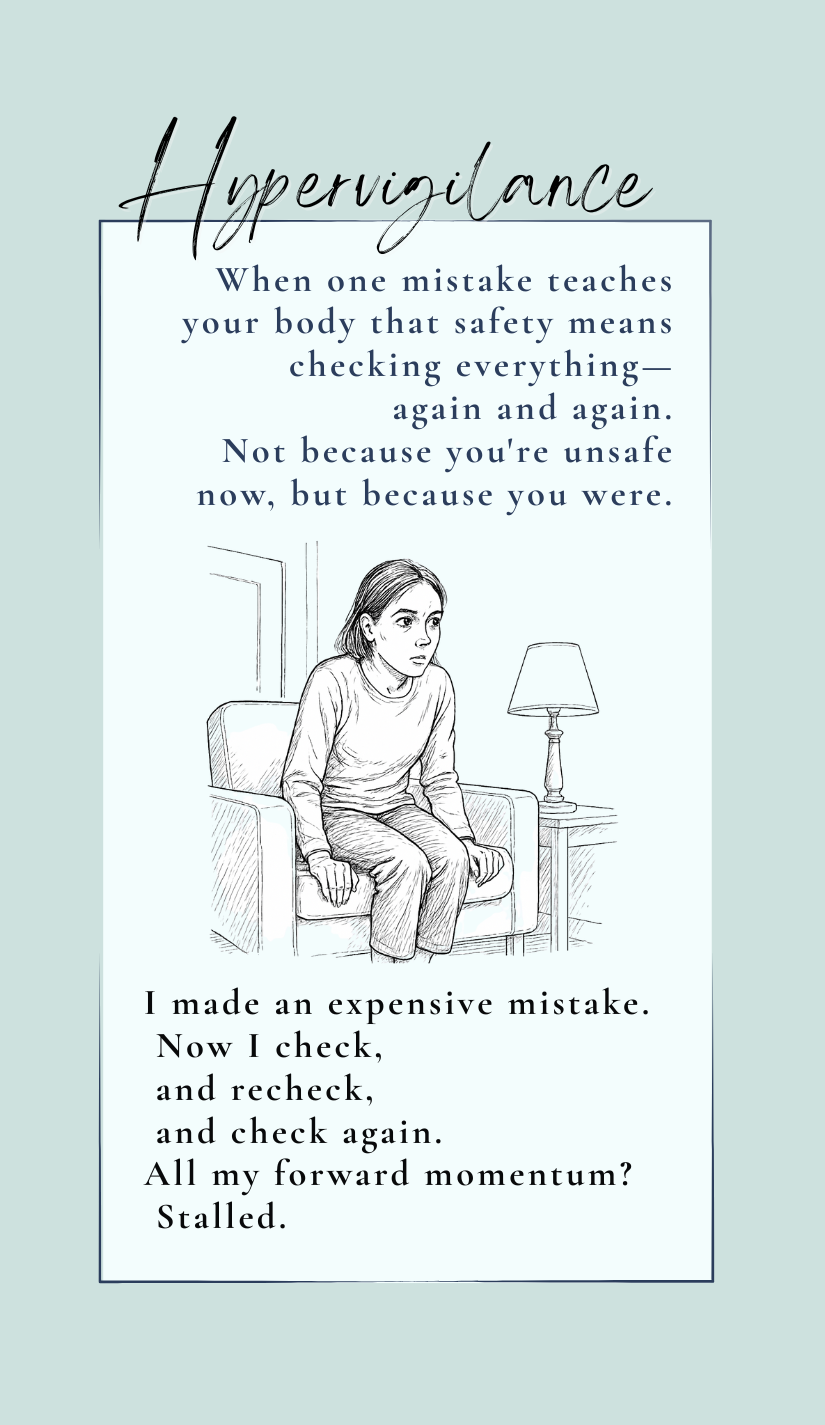Honoring Hypervigilance
A constant scanning for threat — even in safety.
The nervous system stays alert, on edge, braced for impact...
even when nothing is happening.
It’s not paranoia. It’s memory.
Your body still remembers the need to be ready.
I noticed everything—
the shift in tone,
the pause before the answer,
the footstep that didn’t match the smile.
I wasn’t overreacting.
I was reading the room
the way I had to.
I wasn’t paranoid.
I was prepared.
And even now,
when the danger is gone,
my body still leans toward the exits.
Gentle Reflection
Hypervigilance isn’t a flaw in your personality.
It’s a survival response, rooted in experiences where safety was uncertain or unpredictable.
It’s the reason you can spot tension in a voice,
or feel your whole system stiffen when someone walks in.
You notice the unsaid, the almost, the possibility—
before anything even happens.
This state of high alert may have helped you adapt.
It might still help you avoid harm.
But it’s exhausting.
Living in readiness drains your body,
narrows your world,
and makes even rest feel like a risk.
And the hardest part?
Sometimes, you don’t realize how vigilant you’ve been
until the moment you finally soften.
Signs of Hypervigilance - Honoring Your Protective Awareness
Mental & Emotional:
__________________________________
Constantly anticipating worst-case scenarios
"My mind is working hard to keep me safe by thinking ahead"
Difficulty relaxing, even in quiet or calm situations
"My system isn't quite ready to let its guard down yet"
Feeling a vague sense of dread or that ”something's about to go wrong"
”My early warning system is active and trying to protect me"
Startling easily or feeling "on edge" without clear reason
"My nervous system is being extra attentive to keep me safe"
Struggling to trust your own moments of peace
"I'm learning that it's okay to feel calm, one moment at a time"
Physical:
_______________________
Tight shoulders, jaw, or stomach
"My body is holding itself ready, like a loving guardian"
Restless energy — pacing, fidgeting, scanning the room
"My body is staying alert and aware of my surroundings"
Sleep difficulties, especially falling asleep or staying asleep
"My system wants to stay awake to watch over me"
Heightened sensitivity to sounds, lights, or movements
"My senses are finely tuned to notice what's happening around me"
Clenching without realizing (fists, teeth, breath)
"My body is gathering its strength, ready to respond if needed"
Behavioral:
________________________
Rechecking locks, doors, plans, or messages repeatedly
"I'm being thorough in my care and preparation"
Avoiding unknown situations or people
"I'm choosing the familiar because it feels safer right now"
Needing to sit near exits or stay "in control" of your environment
"I'm positioning myself where I feel most secure"
Staying constantly busy
as a way to feel safe
"Movement and activity help me feel grounded and in control"
Difficulty being fully present —
always scanning, calculating, watching
"I'm staying aware because awareness has kept me safe before"
The Caring Voice of Hypervigilance:
"I sense something might need my attention"
"I'm preparing because preparation helps me feel secure"
"I want to stay alert because relaxing feels vulnerable right now"
"I'm the one who notices things, and that's been important"
"I'm being careful because careful has served me well"
Journal Prompts
What was the first environment where I had to be alert
to stay safe?
How does my body feel when I let my guard down —
even slightly?
What do I fear might happen if I stopped
paying such close attention?
Where in my life do I want to feel more ease,
and what support might I need for that?
Activity: Anchors to Return
Choose one of your senses—sight, hearing, touch—and give it permission to take a break.
For example:
Sit in a softly lit room with your eyes closed.
Listen to a calming soundscape while gently
tuning out external noise.Wrap yourself in a blanket and focus on a single, grounding point of contact (feet, spine, palm).
Tell your body:
“For this moment, we are safe enough to pause.”
Even one minute of safety can begin to rewire what
vigilance once protected.
Closing Grace
You are not “too much.”
You are not broken.
You are a body that learned to survive
by noticing everything.
And now, slowly,
you can learn to notice safety too.
Not all at once.
Not without fear.
But with kindness.
And breath.
And time.
